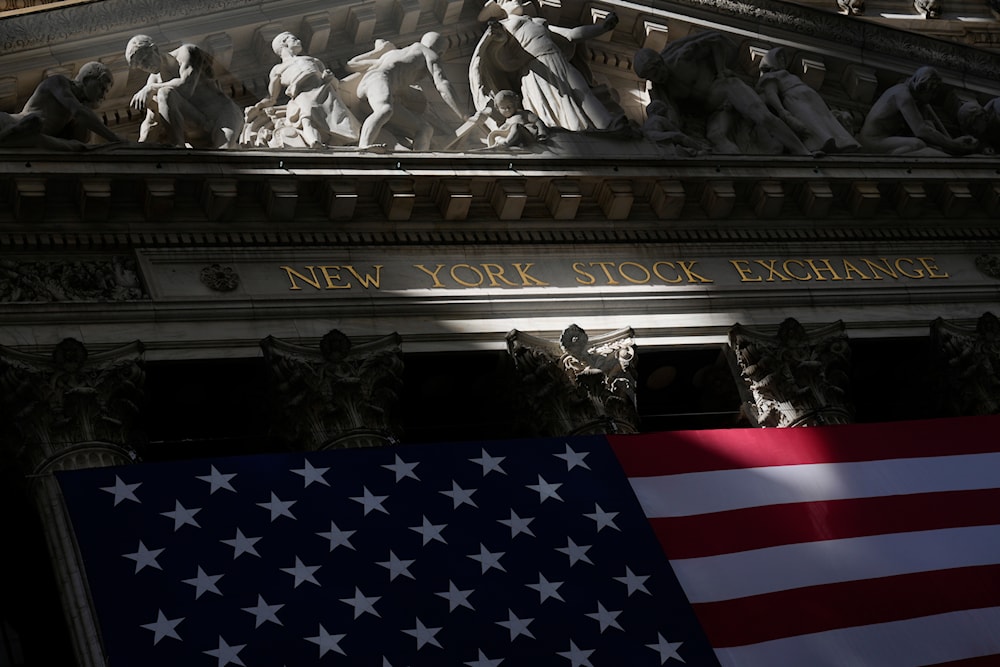US stock market loses $4 trillion as Trump presses on with tariffs
Investor anxiety over Trump's tariffs and economic uncertainty has triggered a $4 trillion stock market sell-off, with major indexes tumbling, tech stocks struggling, and concerns growing over a potential recession.
-

The New York Stock Exchange is seen in New York, on February 26, 2025. (AP)
US President Donald Trump's tariffs have unsettled investors, sparking fears of an economic slowdown and triggering a stock market sell-off that has erased $4 trillion from the S&P 500's peak last month, when Wall Street had largely supported his agenda.
A series of new Trump policies have heightened uncertainty for businesses, consumers, and investors, particularly with the ongoing back-and-forth tariff disputes with key trading partners such as Canada, Mexico, and China.
"We've seen clearly a big sentiment shift," said Ayako Yoshioka, senior investment strategist at Wealth Enhancement. "A lot of what has worked is not working now."
The stock market sell-off intensified on Monday, with the benchmark S&P 500 falling 2.7%, marking its biggest daily drop of the year. The Nasdaq Composite slid 4%, its largest one-day decline since September 2022.
By Monday's close, the S&P 500 was down 8.6% from its February 19 record high, losing over $4 trillion in market value and approaching a 10% decline, which would signal a correction. The Nasdaq, dominated by tech stocks, ended Thursday more than 10% below its December high.
Over the weekend, Trump refrained from predicting whether the US would enter a recession, as concerns grew over the effects of his trade policies.
"The amount of uncertainty that has been created by the tariff wars with regard to Canada, Mexico, and Europe, is causing boards and C-suites to reconsider the pathway forward," Peter Orszag, CEO of Lazard, speaking at the CERAWeek conference in Houston.
"People can understand ongoing tensions with China, but the Canada, Mexico, and Europe part is confusing. Unless that gets resolved over the next month or so, this could do real damage to the economic prospects of the US and M&A activity," Orszag said.
Economic uncertainty looms
On Monday, Delta Air Lines slashed its first-quarter profit forecast by 50%, leading to a 14% drop in its shares during after-hours trading. CEO Ed Bastian attributed the revision to growing economic uncertainty in the US.
Meanwhile, investors are keeping a close eye on whether lawmakers can approve a funding bill to avoid a partial federal government shutdown, in addition to the upcoming US inflation report set for Wednesday.
"The Trump administration seems a little more accepting of the idea that they're OK with the market falling, and they're potentially even OK with a recession in order to exact their broader goals," said Ross Mayfield, investment strategist at Baird. "I think that's a big wake up call for Wall Street."
As of July 2024, data from the Federal Reserve Bank of St. Louis shows that the bottom 50% of Americans hold just 1% of total corporate equities and mutual fund shares, while the wealthiest 10% control 87%.
The S&P 500 surged over 20% in 2023 and 2024, driven by tech giants like Nvidia and Tesla. However, these stocks have struggled in 2025, weighing down major indexes. On Monday, the S&P 500’s tech sector dropped 4.3%, with Apple and Nvidia falling about 5%, while Tesla plunged 15%, erasing $125 billion in market value.
Other risk assets, including bitcoin, also fell 5%. In contrast, defensive sectors like utilities gained 1%, and demand for U.S. government debt increased, bringing 10-year Treasury yields down to around 4.22%.
Investor unease
Despite the recent downturn, stock market valuations remain well above historical norms.
As of Friday, the S&P 500 traded at just over 21 times projected earnings for the next year, significantly higher than its long-term average forward P/E ratio of 15.8, according to LSEG Datastream.
"Many people have been worried about elevated valuations among US equities for some time and looking for the catalyst for a market correction," said Dan Coatsworth, investment analyst at AJ Bell.
"A combination of concerns about a trade war, geopolitical tensions, and an uncertain economic outlook could be that catalyst."
Deutsche Bank analysts said in a note on Friday that investors' equity positioning has fallen in recent weeks, dipping to slightly underweight for the first time since briefly hitting that level in August.
Analysts noted that if equities weighting falls to the lower end of its historical range—similar to levels seen during Trump’s US-China trade war in 2018-2019—the S&P 500 could drop to around 5,300, marking an additional 5.5% decline.

 5 Min Read
5 Min Read








